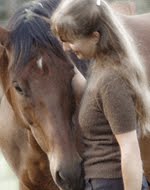In response to the "Life as Teacher" post Noora wrote:
Teaching is actually just forwarding a message of life the way we understand it now...
What an elegant way to put it. That takes out the self-importance and acknowledges that we are receivers and transmitters of a larger message.
So, here's my transmission of the way I understand life in this moment.
I have been noticing the enticing smells all around, like when I walk over the bed of chamomile "weeds" and smell their fruity scent...

or the heavenly scent of these guys that I still don't know the name of, or the intoxicating draft of the wild rose bushes.

Can you guess what Sundance is doing here?

She is stripping the first blooms off of the scotch broom plants. (Close-up below).

Scotch broom is a non-native plant that was introduced as an ornamental shrub. It blooms with these gorgeous yellow flowers from now until late May. The only problem is that they've taken over and become serious underbrush problems which become a high fire hazard as well as overgrowing grasses in many untended pastures. The horses don't eat the whole plant but they love stripping the blooms off and eating them this time of year.

When I got to the pasture today, both Sundance and Patrik were busy stripping and eating blooms. I tried to get a video of it but as soon as Patrik saw I was busy with something in my hand he had to come over and check it out.
We played for a bit and then I bid him good day and went off to play with my human friends. On the walk home, I saw that the clouds seemed to be rolling out, preparing us for a delightful weekend.

I received a message from a Path of the Horse follower who wrote:
I wonder if you can tell me the name of any foundation that is reputable that serves equines by rescue, finding homes, providing care, working on pro equine legislation etc.? I am wanting to leave my estate to this cause and need an organization in this country that will be doing this work for many a moon to come, if you know what I mean!
Do any of you readers have special favorites? I know she is interested in foundations which have enough infrastructure set up that they won't be limited to a single person's lifetime. Go ahead and post information about possible leads here in the comment section.
























































